Why People Talk At Concerts
“Audiences go to gigs not just to listen to music. In my studies of audience behaviour, I found patterns of who talks, where they talk and why. The space occupied by audiences at gigs can be organised into three zones based on distinct types of activities found in each. Zone one, closest to the stage, is the most complicated in terms of physical engagement and has the youngest audience members. The second zone begins about a quarter of the way back into the venue. Interpersonal distances are greater and the audience older. Zone three, at the back of the venue, features the most varied activities and is where the music industry professionals stand — as well as those who don’t like the show.” A handy graph is included!
Two Bros Bro Down on "Is the Web Making Journalism, Like, Bad?"

So this is happening: “To accompany The Economist’s special report on the news industry, Jay Rosen and Nicholas Carr are debating whether the Internet is making journalism better.” Mmmmkay….
Jay: LIKE, YES. IT IS, SO MUCH BETTER.
Nicholas: Do you say so, chappie?
Jay: UH HUH.
Nicholas: I will debate with you! The webs are making journalism far worse than it is.
Jay: HOWEVER COULD THAT BE, THE HEARST CHICAGO-AMERICAN, YELLOW JOURNALISM, CORPORATE OVERLORDS, YADDA YADDA. GOOGLE PLUS, BRIAN STELTER, NYU STUDENTS, PUBLIC-PRIVATE PARTNERSHIPS.
Nicholas: I WENT TO HARVARD AND I MAKE WELL INTO THE SIX FIGURES.
Jay: SOMETHING SOMETHING AJ LIEBLING.
They ramble on about their professional feelings for a while as a bunch of women continue actually working.
Everyone's Building A Block-by-Block Video Guide to NYC
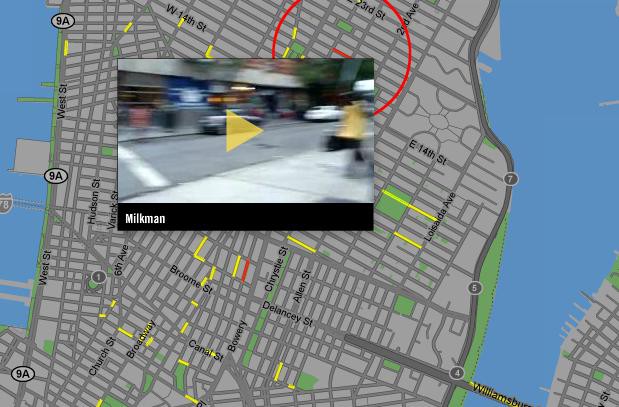
MyBlockNYC is pretty — it’s a map populated by user-uploaded videos. I don’t have a lot of other thoughts about it yet! But I appreciate it.
Recent Trends in Academia
“Excused from the tired, vain, arbitrary business of being a man, he can concentrate instead on being human.”
— Here are some current theories from the field of Lebowski studies.
Murdoch's Brilliant International Tax Game
“News Corp. has 152 subsidiaries in tax havens, including 62 in the British Virgin Islands and 33 in the Caymans. Among the hundred largest U.S. companies, only Citigroup and Morgan Stanley have more tax haven subsidiaries than News Corp.”
— Old Man Murdoch is no dummy. And this comes from the same legal department that engineered the shutdown of News of the World, so you know they know exactly what they’re doing there too. This is, in part, why it was always hilarious when people used to make fun of Murdoch’s New York Post for being unprofitable. That’s part of the plan! Any good media company, from News Corp. to Gawker Media, wants to, in short, lose money in America for tax purposes.
In a World... One Nurse Dares to Enter bin Laden's Compound!
In a World… One Nurse Dares to Enter bin Laden’s Compound!

Every screenwriter in Hollywood’s mind exploded last night, with the news that the CIA recruited a doctor in Pakistan to launch a fake hepatitis vaccination program in order to veryyyy slowly gain access to the bin Laden compound so as to collect DNA. There’s a hot role there for, I dunno, Sheetal Sheth or Mindy Kaling or someone, because:
A nurse known as Bakhto, whose full name is Mukhtar Bibi, managed to gain entry to the Bin Laden compound to administer the vaccines. According to several sources, the doctor, who waited outside, told her to take in a handbag that was fitted with an electronic device.
Now the doctor is in jail in Pakistan for being an American stooge and also, oh right, lots of poor people didn’t get their second and third round hepatitis vaccinations. THEY’LL BE FINE PROBABLY. Ooh, you can call it Abbottabad if it’s all serious, which will remind people of Syriana, or if you go slapstick, you can call it I Stole Osama’s Brain. I can smell the terrible trailer now, because it’s laden with possibilities!
I Am Powerless Over My Addiction To Salt
Science has finally explained why we like salt so much: It’s as fun for our brains as cocaine and cigarettes. Works for me!
Barack Obama's Looming Legume Catastrophe
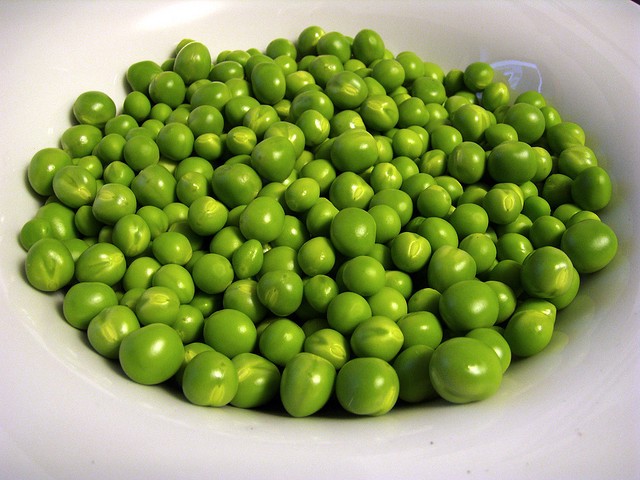
“So does Obama have a pea problem? Mrs. Obama has given them a boost, growing snap peas in her vegetable garden, after all. But a number of 2012 battleground states grow garden peas, including parts of Florida, North Carolina, Virginia and Pennsylvania. North Dakota, Montana and Washington state lead the nation in the number of acres of dry pea production.”
— The Los Angeles Times takes stock of the shifting political landscape in the wake of President Obama’s remark that legislators “might as well do it now; pull off the Band-aid, eat our peas,” in the fight over the nation’s debt limit. Representatives for Johnson & Johnson, the maker of Band-aids, were apparently not consulted for this article.
Photo by Kari Söderholm
Tiny Gardens: The Terrific Stoops, Roofs and Bitty Front Lawns of Brooklyn
by Jessica Machado
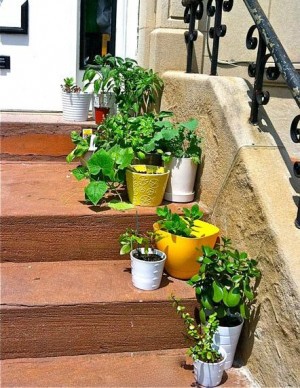
Last August, Jill Harrison bought a house on a very manicured block of Crown Heights. She hasn’t had to leave her property to meet the neighbors. The time she spends on her front lawn, installing native plants, herbs and sedum, brings neighborhood kids wanting “to pick something” and nods of approval from old-timers headed to the nearby Baptist church or West Indian restaurant. Most impressive to passers-by: her stoop, where, in more than 17 pots and containers, she’s growing wild strawberries, Portuguese peppers, a blueberry bush, lemon verbena and cucumbers — basically, she said, “things we can eat or put in our drinks.”
“It’s an easy conversation starter,” she said of her garden. “You don’t have to make up something to talk about. And under what circumstances do you normally just go up to somebody on the street and start talking to them?”
A neighborhood away in Prospect Heights, Chris Phillips and his partner Rich Powell have also learned how a thatch of green and several bushels of lavender can get people to do the unthinkable — instigate a conversation with strangers, and even more surprisingly, relinquish what little private time they have. Back in 2008, the pair decided to turn a space on their co-op’s roof into a “higgly piggly English garden” with rose bushes, potted herbs and random trees from plant sales. Soon after, other residents began wandering up, bringing bottles of wine and pulling up a chair for an after-work chat.
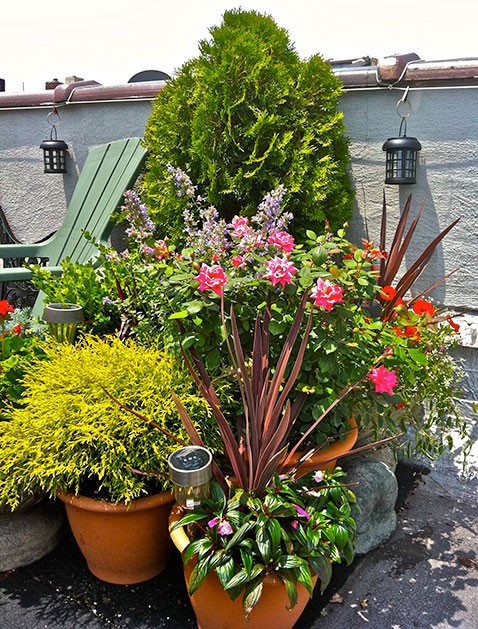
“Now it’s like the kitchen table where everyone congregates,” said Powell. “Instead of having to invite everyone into your home where it’s a mess, up here, it’s top quality.”
While most Brooklynites aren’t blessed with roof access and front yards, or the ability to afford a down payment on a home, some gardeners make do with what they’ve got — and that includes itty-bitty pieces of real estate with heavy foot traffic. Sandwiched between a postal store and a condemned bodega, Meret Lenzlinger has cultivated a forest of exotic grasses, roses, pansies and Mediterranean herbs right outside of her apartment’s front door on bustling Washington Avenue. “In my neighborhood everyone is walking, getting from one place to another. I wouldn’t know who’s around here as much without my garden.” As she said this, an older woman and younger gentleman waved hello and a bicyclist slowed down to ask how she’s doing on this fine, sunny day.
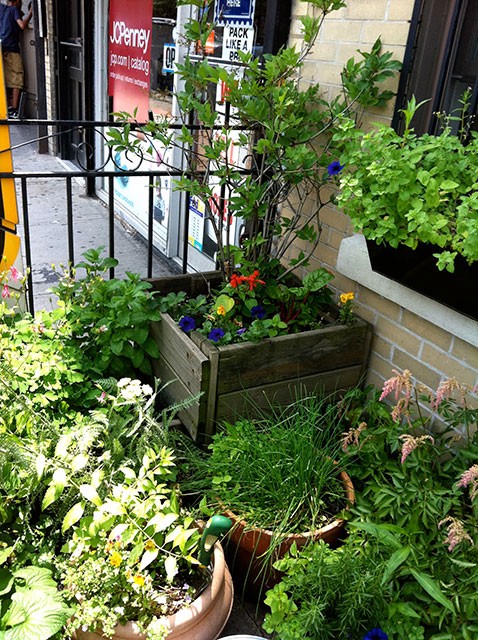
“To be honest, I think some people feel I’m more approachable because there is this little fence between me and them,” she said of the three-foot-high, wrought-iron boundary that stands between she and I — a reasonable border for a low-risk, casual (i.e. “I promise I’m not going to bother you or ask anything of you”) conversation.
Over in South Slope, Michiko Okochi, who also has an eye-catching street garden, though hers is next to the expressway, validates these sentiments. At first approach, Okochi was hesitant to speak to someone with an objective (“Hi, I’m writing a story”) and took a step back (“Sorry, my English isn’t so good”), but then brightened up when she learned that the topic is gardens. “Oh, I’ve been keeping up with my garden for 25 years,” she said, pointing out the purple flowering vines entwined around her window bars and the oregano and thyme sprouting up from ceramic pots. “I’ll never stop because my neighbors would get upset. If you want sometime, I’ll show you my backyard.”
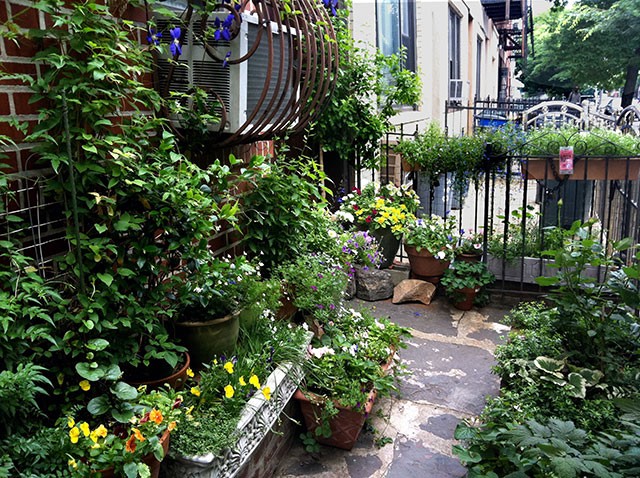
Within a two-mile radius from Okochi’s brownstone, there are at least nine community gardens — ones where schoolchildren plant vegetables for classes, others that offer free afternoon yoga. Throughout Brooklyn, there are more than 200 community gardens total. That’s about 40 percent of all gardens in the city.
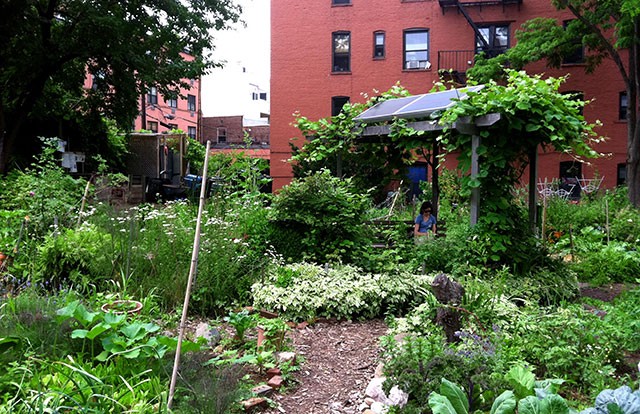
For some, it represents a yearning for a sense of the borough’s close-knit, working-class, non-condo enclaves of yore; for transplants, it could be a natural, though reluctant, seeking out of the suburbia from which many of them first fled. Or it could be as simple as people are happy to be outside. It’s summer, for chrissakes!
Walk into one of these community gardens and what you tend to find isn’t necessarily a party, but people sitting alone, or reading a book. or sticking their hands in the earth. These are people enjoying all that is alive and flourishing yet silent and still.
“Stepping outside for a minute or two keeps me calm,” said Majo Tinoco of the plants that line the terrace of her studio apartment. “I need to have that interaction with my little leaves and flowers, pulling off dead ones, checking what’s blooming.”
With her garden situated on the backside of her building, Tinoco doesn’t tend to her morning glories every day in hopes of meeting her neighbors, she said. But then again, she did invite me up to see after talking to me for only ten minutes at the local community garden.
“This is much more of a neighborhood than any other place I’ve ever lived. People are involved in that neighborhood energy,” Tinoco, who moved here from Colombia years ago, said about Brooklyn, and in particular, the South Slope. “I mean, I have friends who call and ask to borrow sugar.”
Jessica Machado lives in Brooklyn and has been exaggerating trends under the guise of journalism for far too long.
Alexander McQueen Show: Closing Soon, Extended Hours
Ooh, the Alexander McQueen show at the Met is now opening earlier for members and staying open later for the general public in the first week in August. Warning: the show allegedly closes August 7! That’s soon! (Pro tip: go EARLY. The lines are bonkers.)
